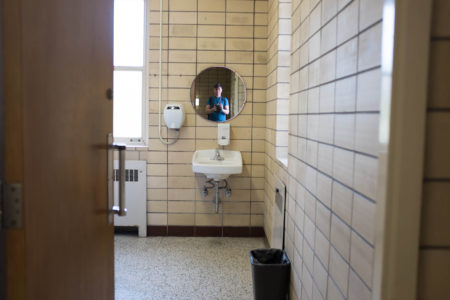Month: May 2017
Animal transport and the ethics of meat
In a perceptive tweet Ziya Tong argued: “In the 21st century you’ll find cameras *everywhere* except: where our food comes from, where our energy comes from, and where our waste goes”.
I have long been of the view that if people were forced to look at where our meat, eggs, and dairy come from, few would still be willing to eat them.
That lines up with a recent episode of The Current, in which Anita Krajnc’s acquittal for giving water to pigs heading to a slaughterhouse was used to open a broader conversation about animal transport in the meat industry, including high mortality among “spent hens” used to make nuggets and chicken soup.
My vegetarianism has softened since the long period when I was pretty strict about it starting in 2005, though not for any morally-informed reason. Rather, I think it has just been a result of the way meat-eating (among so many other unsustainable and potentially unethical behaviours) is normalized in our society.
At a minimum, I will try to be more mindful again going forward. Talk of “spent hens” and the conditions of pig, cattle, and horse transport has kept me vegetarian since the broadcast.
Related:
Spires
Establishing a Responsibility to Repair
The concept of Right to Repair is meant to help consumers and tinkerers keep their vehicles, electronics, and other equipment going, despite the preferences of manufacturers that they buy something new or at least pay the original builder for any repairs.
In a more sustainable world, we can imagine a Responsibility to Repair, where any manufacturer of a product intended to be durable – from a phone or laptop to a car or house – would be expected to support repairs by providing blueprints and source code, by making spare parts available, and by designing products in the first place so that failures can be repaired (a) by individual users (b) by third-party repair centres and (c) by the company itself.
This is the opposite of the Apple philosophy of keeping everything secret, building machines that cannot be taken apart, and throwing away anything broken to replace it with something new.
In a Responsibility to Repair world, governments could keep track of all devices which consumers report as broken and impossible to fix, and then press companies to comply with regard to those items. Companies that refuse could face sactions from fines to losing the right to advertise to losing the right to make products in certain categories.
It would be the end of planned obsolescence, and the start of a much more sustainable form of consumerism. Even for companies that close down, this approach would create multiple benefits, since their design specifications and software would be openly available and their products would be designed with public repair in mind from the beginning. If one big jurisdiction like the EU were to establish laws of this kind, the benefits would be felt around the world.
Over the shoulder
France’s 2017 election
What a relief! The last thing the world needs now is the EU falling apart, or another victory for an anti-immigration propagandist.
The largest problems we face now call for us to think beyond national units, about the interests and choices of humanity as a whole. Splitting into small combative tribes is a deeply maladaptive response to the pressures we’re feeling.
Red and white
Automated voice impersonation
I’ve written before about some problems with biometric security: it seems convenient to be able to use facial recognition to log in to your computer, until you find your co-workers doing it with colour photocopies of your picture.
Computers aren’t the only context where we use biometrics for identification. “Don’t you recognize my voice?” has been used for decades for authentication over the phone, whether implicitly or explicitly. Now, we’re approaching the day when faking anybody’s voice and having it say anything you like is getting near.
Expect disruption on every level, from teens pranking each other to abusive harassers terrifying victims in new ways to more election-altering political fraud.






